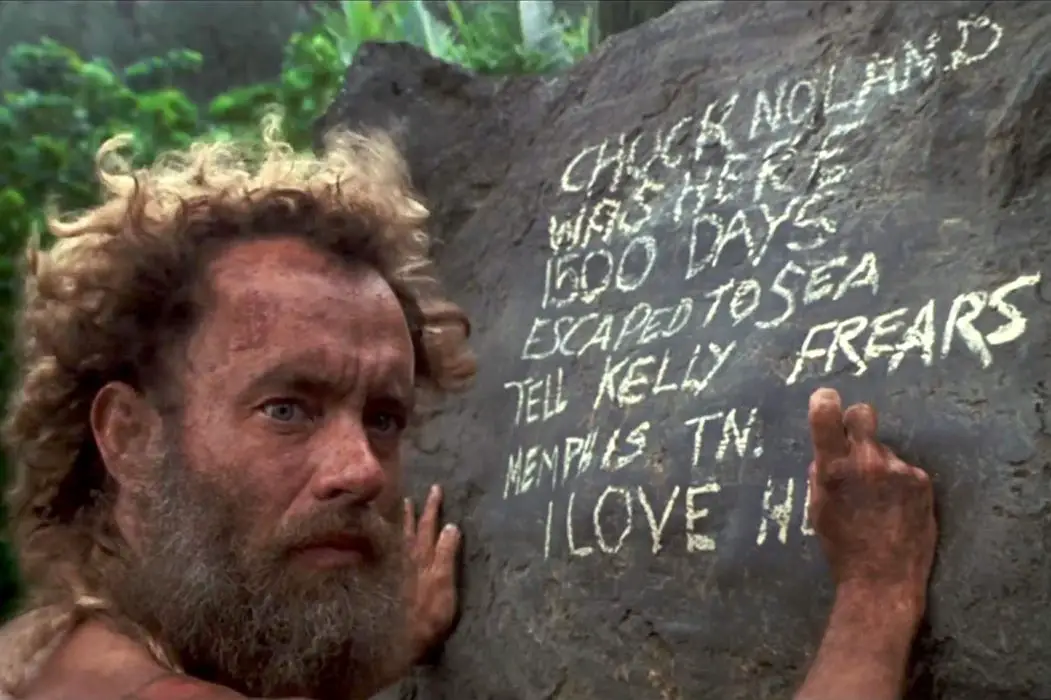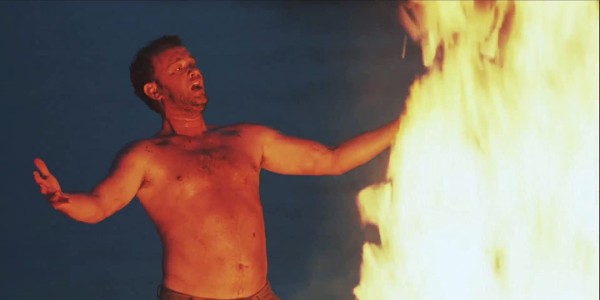CAST AWAY 20 Years Later: An Ode To Tom Hanks

Let me ask you something: Do we undervalue Tom Hanks? I can, of course, hear your replies now, talking about how he has two Oscars, won a Cecil B. DeMille award at this year’s Golden Globes, and has embraced the mantle of “America’s Dad.”
So, yes, we know Tom Hanks is a treasure, all you had to do was see the outpouring of concerned responses to his coronavirus contraction back in March, but do we truly have a grasp on why he’s so beloved?
“He’s good; he’s always good.”
That was the response among my family after seeing Hanks portray Mr. Rogers in the picture Won’t You Be My Neighbor last Thanksgiving, a film that’s narrative choices aren’t up to its stylistic ambitions but does provide a clever piece of casting in Hanks. He may not look or sound anything like Rogers, but they share a similar aura of goodness. As it turns out, “good,” as my family would describe him, is not a mere judge of acting ability but rather a gentleness and approachability that Hanks has on screen.
Just as Rogers was emotionally vulnerable in his program, so is Hanks in his performances, and there’s arguably no better performance to see this gift at work than Cast Away. For one, this year marks the picture’s 20th anniversary, making it a timely revisit, but it is also quite possibly the most stripped away movie Hanks has ever been in.
Magnetism
Films about isolation are often the truest test of one’s caliber as a movie star because there are no distractions. It’s the magnetism of the performer and his or her relationship with the audience that has to hold the film together. However, as I thought more about other films in the same vein as Cast Away, I began to notice a distinct difference from the way other stars play these roles as opposed to Hanks.

Most actors would make this a movie about suffering as if to telegraph the hardships that went into making the picture, and by extension, making you respect the effort more. It’s partially why something like The Revenant doesn’t quite work, despite its technical brilliance. Every moment feels like hands waving, screaming, “Hey, over here, look how much I’m suffering for my art!”
While Cast Away indeed contains moments of suffering, including a collision between Hanks’ tooth and a pair of ice skates that might be my greatest dental nightmare, Hanks always manages to imbue the movie with humanity. His emotions extend far beyond the physical and mental toll of being stuck on that island. There’s confusion, longing, and even moments of brief celebration. Simply put, he’s playing the character and not the pain.
Lack of Showmanship
But it’s the ease by which Hanks weaves in and out of these various emotions that’s most impressive. He’s always been an actor whose most significant strength is his everyman quality, brought about by gentleness and lack of showmanship in his acting. Hanks is rarely playing to the back of the rafters but subtly honing in on the emotional truth of the scene. That’s what makes his reactions feel genuine.

Take the scenes in Cast Away of Hanks interacting with Wilson. On paper, there’s arguably an absurdity in the idea of him using a volleyball with a smiley-faced bloodstain as a form of companionship. However, the movie still miraculously makes it work. Upon rewatching, I thought back to another “star in isolation” movie that employs a similar technique, I Am Legend, in which Will Smith is the last survivor in New York City after deadly pandemic (timely, huh?). Like Hanks in Cast Away, Smith turns to inanimate objects for both companionship and normalcy in an extreme situation.
Throughout his neighborhood, Smith has set up mannequins whom he interacts with as though they were his actual neighbors, asking about their days and even flirting with one of them at a video store. These scenes never quite work because we’re always set-up to view Smith’s behavior as unnatural, with every action and line he delivers appearing as a cry of desperation. Hanks, meanwhile, never brings attention to the despair of his character.

Wilson ultimately comes to represent more than just a need for connection. Hanks is never straining in these moments, understanding that the ball is actually an extension of himself. Wilson is the part of his mind that pushes him to think critically and retain hope needed to keep alive. Part of what makes the scene of the ball floating out into the vast Pacific Ocean so painful is Hanks’ embracement of the ball as a living breathing character. For us as audiences, it’s not a scene showcasing a man’s loss of sanity but mourning the loss of a partner, a friend.
It’s in the Eyes
But, watching Cast Away, for now, the umpteenth time, the one detail I became most transfixed on was Hanks’ eyes. It’s there where his subtlety and soulfulness genuinely lie. They’re what makes it look like Hanks is gazing into the past while recounting his life in Forrest Gump, or how we understand the trauma and fear a commanding officer hides from his men in Saving Private Ryan. And, in Big, they twinkle with the child-like innocence of a boy trapped inside a man’s body.
In Cast Away, they’re longing, mournful, and often calculating, desperately scanning the horizon for hope. You really begin to notice them in the movie’s final act, as Hanks is reunited with the civilized world but oddly out of place in it.
The eyes convey years of survival, a sense of longing for a life that has left him behind, and above all else, uncertainty. On this island, he had only his need to survive, hope on one day getting off that rock. As strange as it seems, the most haunting, and for me memorable, image from the film is not on a tropical island or the endless ocean, but Hanks, staring out the window, clutching a cup of ice, a luxury he’s lived without for years.
Every detail and trial from the movie up to that point is captured in the look on his face, along with a million unanswerable questions about what comes next. So, maybe that’s why we genuinely love Tom Hanks, why we feel so connected to him, and why we are so emotionally taken by his presence. He’s always been an actor able to provide us with a window into the interior of his characters. Cast Away puts his talents and instincts on full naked display, offering us as viewers a chance to understand what makes his many other memorable performances so endearing.
What do you think is Tom Hanks’ best performance? How high would you rank Cast Away among his work?
Watch Cast Away
Does content like this matter to you?
Become a Member and support film journalism. Unlock access to all of Film Inquiry`s great articles. Join a community of like-minded readers who are passionate about cinema - get access to our private members Network, give back to independent filmmakers, and more.











